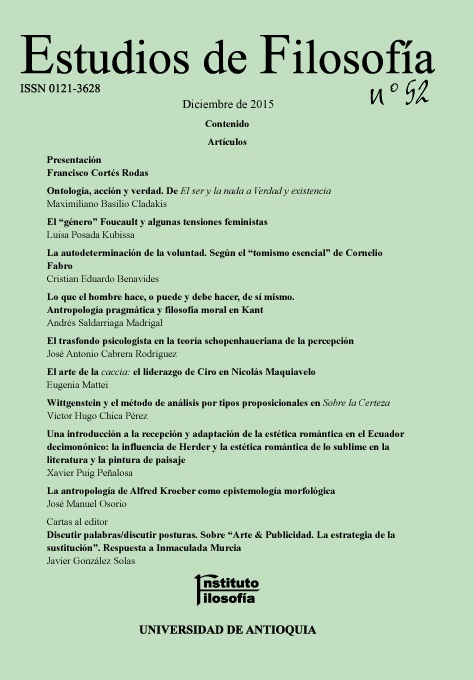The Antropology of Alfred Kroeber as Morphological Epistemology
DOI:
https://doi.org/10.17533/udea.ef.n52a10Keywords:
Goethe, Kroeber, Morphology, Science, AnthropologyAbstract
The main thesis of the article is that Goethe’s morphology can serve as a reading guide to Alfred Kroeber’s anthropology. Specifically, the comparative study will help the reader by providing unity to Kroeber’s methodological reflections on the concepts of history and pattern in Alfred Kroeber’s oeuvre.
Downloads
References
Amrine, F. (1998) “The Metamorphosis of the Scientist”, en: Goethe’s Way of Science. (s.l.), (s.e.).
Blunden, A., “The Urphänomen and the Absolute” [sitio en internet], disponible en: http://home.mira.net/~andy/works/religion.htm. (s.f.).
Bortoft, H. (1996) The Wholeness of Nature: Goethe’s Way Toward a Science of Conscious Participation in Nature, Aurora: Lindisfarne Press.
Goethe, J. W. (1971) Goethe’s Color Theory, “Cautions for the Observer”, editado por R. Matthaei, New York: van Nostrand Reinhold.
_______ (1995) Scientific Studies (Goethe: The Collected Works, Vol. 12), traducción de Douglas Miller, Princeton: Princeton University Press.
_______ (2007) Teoría de la naturaleza, traducción de Diego Sánchez Meca, Madrid: Tecnos.
Heitler, W. (1998), “Goethean Science”, en: Goethe’s Way of Science. (s.l.), (s.e.).
Kroeber, Alfred. (1975) “Lo superorgánico”, en: El Concepto de Cultura: Textos fundamentales, edición de J. S. Kahn y traducción de Antonio Desmonts, Barcelona, Anagrama.
_______ (1968) The Nature of Culture, Chicago, The University of Chicago Press.
Remotti, F. (1974) “Introduzione all’edizione italiana”, en: Kroeber, A., La natura della cultura, traducción de Pier Giovanni Donini, Bologna, Societá editricie il Mulino.
Seamon, D. (1998) “Goethe, Nature, and Phenomenology: An Introduction”, en: Goethe’s Way of Science: A Phenomenology of Nature, editado por David Seamon & Arthur Zajonc, Albany, State University of New York Press.
Smith, Jonathan Z. (2000) “Acknowledgments: Morphology and History in Mircea Eliade’s “Patterns in Comparative Religion” (1949-1999), Part 1: The Work and Its Contexts”, en: History of Religions, Vol. 39, No. 4.
Wolf, E. (1981) “Alfred L. Kroeber”, en: Totems and Teachers. Perspectives on the History of Anthropology, editado por Sydel Silverman, Nueva York: Columbia University Press.
Zajonc, A. (1998) “Goethe and the Science of His Time”, en: Goethe’s Way of Science. (s.l.), (s.e.).
Published
How to Cite
Issue
Section
Categories
License
Copyright (c) 2015 José Manuel Osorio

This work is licensed under a Creative Commons Attribution-NonCommercial-ShareAlike 4.0 International License.
Authors who publish with this journal agree to the following terms:
1. The Author retains copyright in the Work, where the term "Work" shall include all digital objects that may result in subsequent electronic publication or distribution.
2. Upon acceptance of the Work, the author shall grant to the Publisher the right of first publication of the Work.
3. The Author shall grant to the Publisher a nonexclusive perpetual right and license to publish, archive, and make accessible the Work in whole or in part in all forms of media now or hereafter known under a Creative Commons Attribution-NoCommercia-ShareAlike (CC BY-NC-SA 4.0), or its equivalent, which, for the avoidance of doubt, allows others to copy, distribute, and transmit the Work under the following conditions: (a) Attribution: Other users must attribute the Work in the manner specified by the author as indicated on the journal Web site;(b) Noncommercial: Other users (including Publisher) may not use this Work for commercial purposes;
4. The Author is able to enter into separate, additional contractual arrangements for the nonexclusive distribution of the journal's published version of the Work (e.g., post it to an institutional repository or publish it in a book), as long as there is provided in the document an acknowledgement of its initial publication in this journal;
5. Authors are permitted, and Estudios de Filosofía promotes, to post online the preprint manuscript of the Work in institutional repositories or on their Websites prior to and during the submission process, as it can lead to productive exchanges, as well as earlier and greater citation of published work (see The Effect of Open Access). Any such posting made before acceptance and publication of the Work is expected be updated upon publication to include a reference to the Estudios de Filosofía's assigned URL to the Article and its final published version in Estudios de Filosofía.















